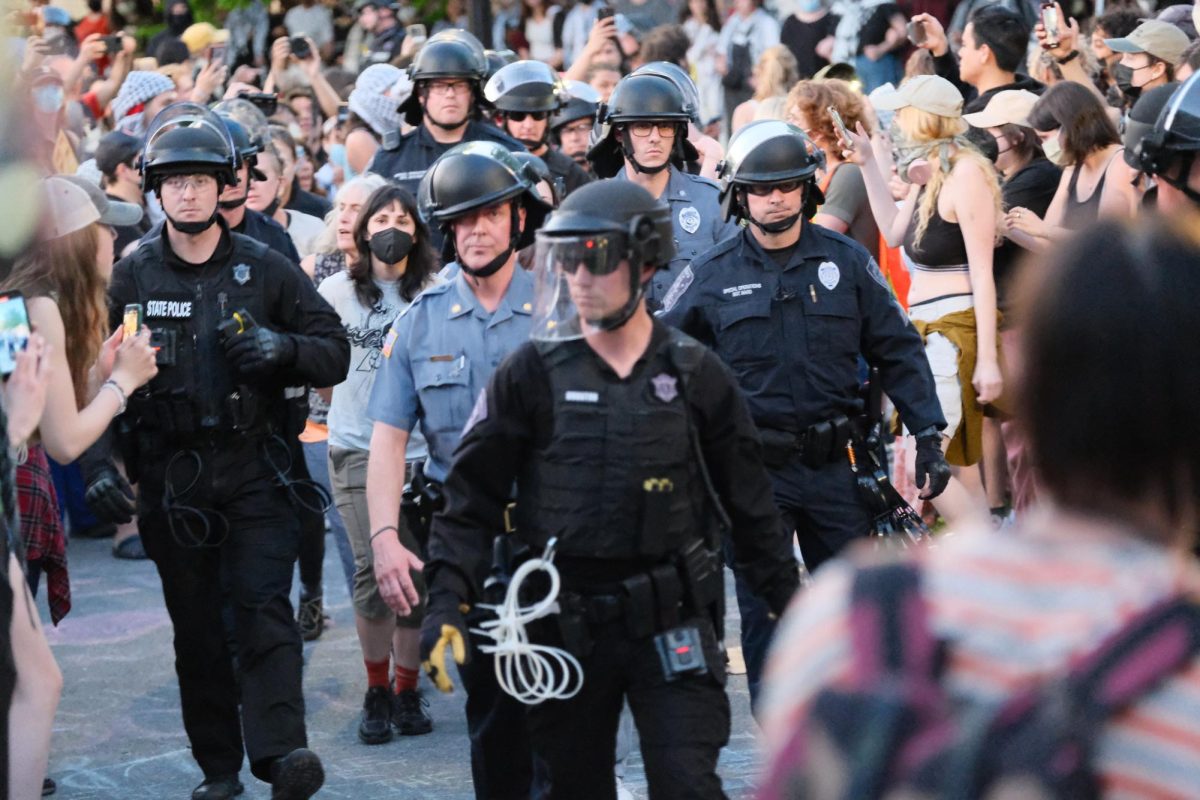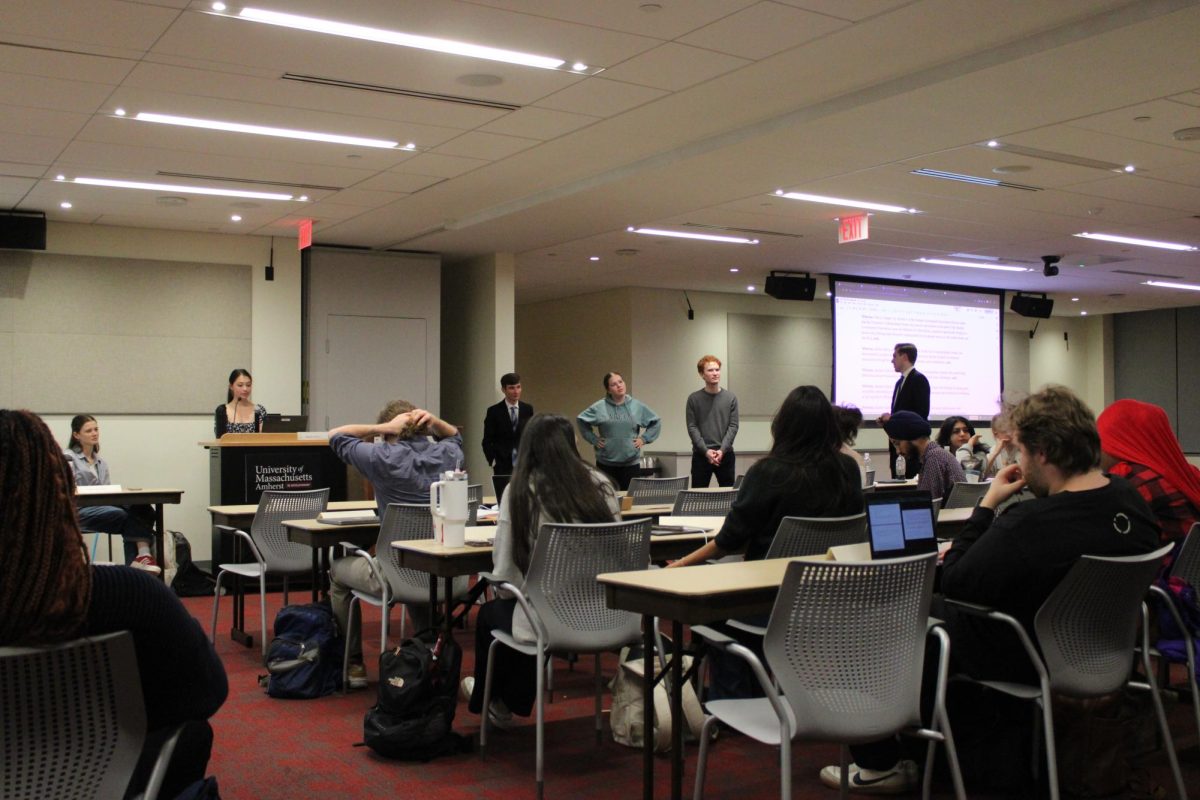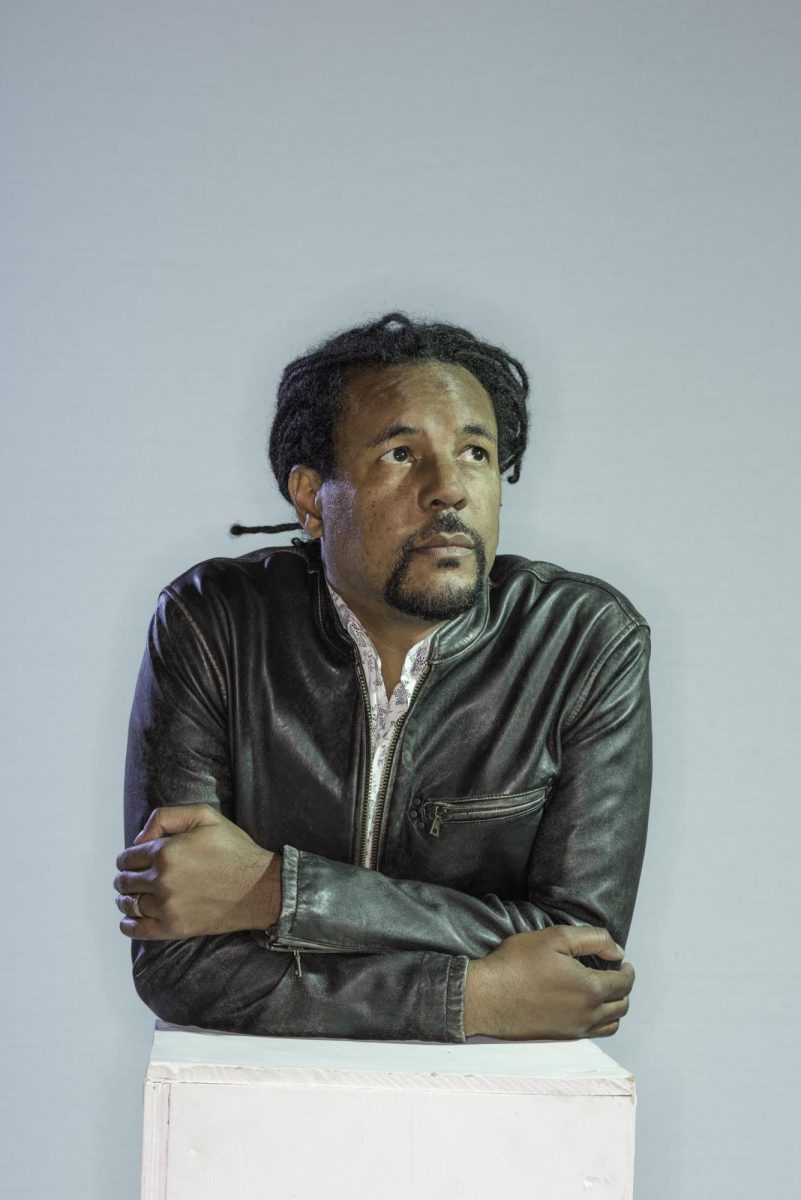On May 20 at the University of Massachusetts, the first general faculty meeting in 15 years was held to debate a vote of no confidence in Chancellor Javier Reyes following the decision to use militarized police to break up a pro-Palestinian encampment on May 7. A vote of no confidence was passed with 473 faculty and librarians in favor, 332 against and 20 abstentions.
Prior to the meeting, a letter was signed by 225 faculty that demanded Reyes immediately resign.
Over 700 faculty attended via zoom, with approximately another 300 in person. The over 4-hour long meeting was rife with technical difficulties, breaches of Robert’s Rules of Order and disagreements between faculty members on how to proceed. A majority of the meeting time was spent troubleshooting technical issues and discrepancies in the voting and debating process. Many attendees complained they did not have access to the voting forum and were instructed to cast their vote via email.
Multiple faculty spoke out against the voting process and claimed that the process was unfair because they did not get voting links via email. Faculty members had issues receiving ballots and registering their emails. One faculty member said that they mistakenly voted the wrong way and wanted to change their vote, but their request was denied. Some attendees expressed concerns about the accuracy of the final votes representation due to inconsistencies of the voting process and the fact that over 100 people had left before the conclusion of the meeting.
Laura Briggs, a professor in the Women, Gender, and Sexuality Studies department and Cedric de Leon, a professor of sociology, gave a short presentation before the vote about the events of May 7. They recounted a timeline of the encampment and arrests, citing violent interactions some protesters had with police. Both expressed concerns about how the University’s reputation has changed following the mass arrests in October and May.
De Leon said, “We have no prerogative to fire the chancellor but we can hold him accountable.”
During a brief Question and Answer session, Daniel Gordon, professor of history asked, “Why are we moving so fast? Why must we make a judgment about [Reyes’] judgment now?…What exactly is the emergency?” De Leon responded with a video compilation taken on May 7 of various protestors’ interactions with State and UMass police.
Briggs described Reyes’ actions as an “unprecedented interpretation of the Land Use Policy” citing campus protests in the past which utilized similar encampment strategies but were not met with police force. Briggs also quotes recent statements made by the American Historical Association and the American Civil Liberties Union of Massachusetts condemning Reyes decision to call police to the protest.
There were concerns over the definition of no confidence and phrasing of the motion, with some claiming the language mis-representative and vague. There was a motion to replace the term “no confidence” with “censure” to more accurately reflect the views of some faculty who denounce Reyes’ actions but have not yet lost full confidence in his leadership.
Briggs responded, “We have as the faculty no power to remove Chancellor Reyes. It is an expression of our opinion that we have no confidence in the Chancellor.” The proposed amendment was rejected by a majority vote of the faculty.
Faculty members split into two groups to voice their opinions about voting in favor of the motion of no confidence or against. Those who spoke in favor, some of whom were faculty that were arrested, cited similar facts about the discrepancy in administration response from the recent encampment to similar protests in the past. Many were concerned that trust between the students and faculty had been broken, and said Reyes had offended the core values of UMass. Many cited that Colson Whitehead and other prominent figures have condemned the involvement of police, as well as the no confidence votes already passed by the Student Government Association and the Graduate Employee Organization.
Diana Sierra Becerra spoke in favor of the motion citing the recent meeting Reyes held with faculty, saying “I was appalled that he did not even reflect on his actions, let alone show empathy for our injured students … he is hurting our national and international reputations.”
“Academic sanctions in addition to the legal charges have negatively impacted the health and the academic focus of our students…in my last day of class we spent it sobbing, recounting police violence.”
“Practicing anti-racism means holding people in power accountable, and as a woman of color I have zero confidence in Chancellor Reyes,” Becerra said.
UMass Librarian Isabel Espinal also spoke in favor of the motion over zoom saying, “I was at the encampment and it was the most thoughtful and inclusive and educational protest action I have seen in my 26 years here …the students especially should be celebrated not treated they way they were.”
“When I was at the Faculty Senate meeting on Tuesday May 14, I saw absolutely no evidence that [Reyes] heard us, or understood the deep wounds that were inflicted across this campus.”
“When asked to support a vote of no confidence I hesitated. I wasn’t ready to do that…But it broke my heart to see these events unfold. Heartbroken I am supporting this vote,” Espinal said.
Jeanne Hardy later spoke passionately against the motion and voiced her support for Reyes’ leadership and said, “everyone who has been talking today is surprised that the police were brought in. Well there isn’t a surprise, they were warned for seven hours.”
“They were surprised that students were pushed down [during arrests], that’s what happens when you get arrested,” she said. Hardy received boos and groans from the audience and attempted to strike this statement from the record.
Some faculty were concerned with the speed in which this meeting process has taken place, saying it’s unacademic to make big decisions in the thick of emotions and without all the evidence cemented. Others countered this point by saying trust in Reyes has been dropping since the first arrests back in October.
Lisa Fontes, a professor from University Without Walls said, “Those who put forth this motion are acting as if this is a vote on police brutality…This is not a vote against police brutality. This is also not a vote against the Middle East. This is a vote against the first and only Latino Chancellor on this campus … he walked into a mess this year.”
“I do not believe pushing out Chancellor Reyes will solve the problem of police brutality in this State, and it certainly will not tell us how to act in the future in terms of when or how to call the police or other systems to manage difficult situations,” Fontes said.
Immediately following the vote of no confidence, UMass President Marty Meehan and Board of Trustees Chair Stephen Karam sent a letter to the UMass community reaffirming their support of Reyes.
Reyes also sent an email in which he stood by his actions: “While I hope we never find ourselves in a situation like this again, I firmly believe my decision was made in the best interest of our entire community’s safety,” saying since arrests they have learnt of the flammability of the encampment structure.
A 2017 research study on the effectiveness of faculty votes of no confidence found that no confidence votes resulted in the removal of the president or chancellor from their position within six months 56 percent of the time.
Grace Lee can be reached at [email protected]. Lucas Ruud can be reached at [email protected].









